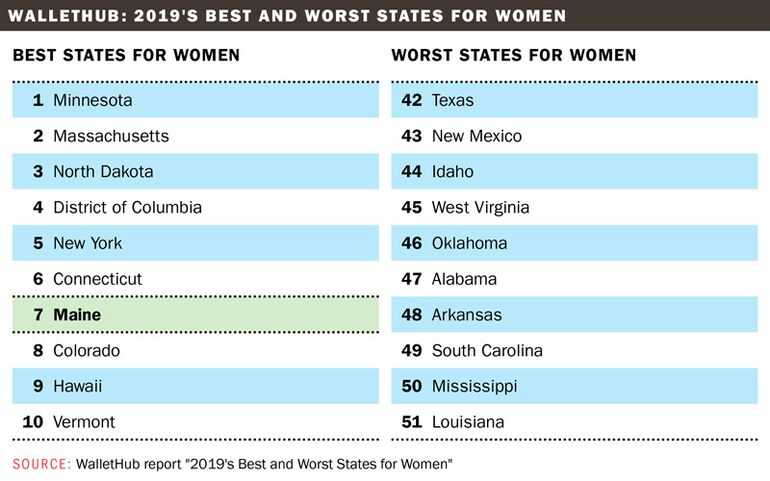WalletHub ranks Maine in top 10 of 'best states' for women

Maine ranks seventh best in WalletHub’s “best and worst states for women,” released today by the personal finance website.
The list compares the 50 states and the District of Columbia across 24 key metrics. It analyzed data ranging from median earnings for female workers to women’s preventive health to the percentage of women-owned businesses.
Here’s how Maine ranked in WalletHub’s report in some of the key metrics related to women (1=best, 25=average):
- 11th – Unemployment rate for women
- 20th – Share of women in poverty
- 23rd – Share of women-owned businesses
- 14th – High school graduation rate for women
- 2nd – Share of women who voted in 2016 presidential election
- 22nd – female uninsured rate
- 22nd – Women’s life expectancy at birth
- 6th – Quality of women’s hospitals
- 11th – Women’s preventive health care.
In WalletHub’s “best versus worst comparisons”:
- The District of Columbia has the highest median earnings for female workers (adjusted for cost of living), $34,417, which is 1.5 times higher than in California, the lowest at $22,508.
- The District of Columbia has the highest share of women who voted in the 2016 presidential election, 77.2%, which is 1.6 times higher than in Hawaii, the lowest at 49.3%.
- New Hampshire has the lowest share of women living in poverty, 8.9%, which is 2.6 times lower than in Mississippi, the highest at 23.5%.
- Alaska has the highest share of women-owned businesses, 22.87%, which is 1.6 times higher than in South Dakota, the lowest at 14.04%.
- Massachusetts has the lowest female uninsured rate, 2.3%, which is 7.6 times lower than in Texas, the highest at 17.5%.
Noting that March is “Women’s History Month,” WalletHub reported that women only hold 23.7% of the seats in Congress despite making up 51% of the U.S. population.
Data used to create the rankings were collected from the U.S. Census Bureau, Bureau of Labor Statistics, Centers for Disease Control and Prevention, National Center for Educational Statistics, Federal Bureau of Investigation, Violence Policy Center, National Center for Injury Prevention, Council for Community and Economic Research, Womenable, American Express OPEN, U.S. News & World Report, Institute for Health Metrics & Evaluation and WalletHub research.










Comments